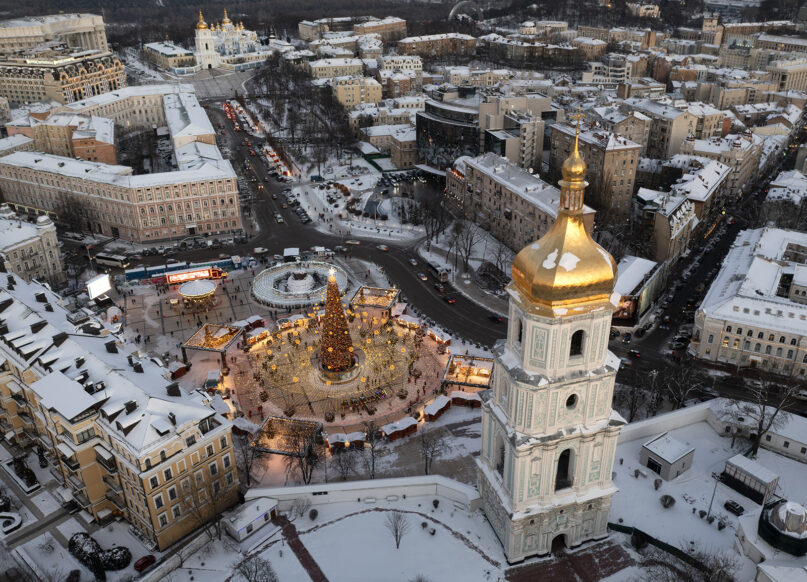(RNS) — Nearly five years after the Orthodox Church of Ukraine was recognized as independent from the Russian Orthodox Church by the Ecumenical Patriarchate of Constantinople, the OCU has further cemented its split from the Russian counterpart by adopting a new liturgical calendar.
“This is a decision that the majority of the faithful of our Church and the majority of Ukrainian society are waiting for from us,” the OCU said on its official Facebook page in late May, after its assembled bishops voted for the change. The decision still needs to be approved by the church’s ruling council in July, but it is expected to pass. The calendar shift is then slated to go into effect on Sept. 1 of this year.
The most palpable impact will be that millions of Ukrainians will celebrate Christmas with the Western world on Dec. 25, instead of the day two weeks later when Russian and other Eastern Orthodox churches, following the Julian calendar, mark Christ’s birth.
Westerners adopted the Gregorian calendar introduced by Pope Gregory XII in the 16th century.
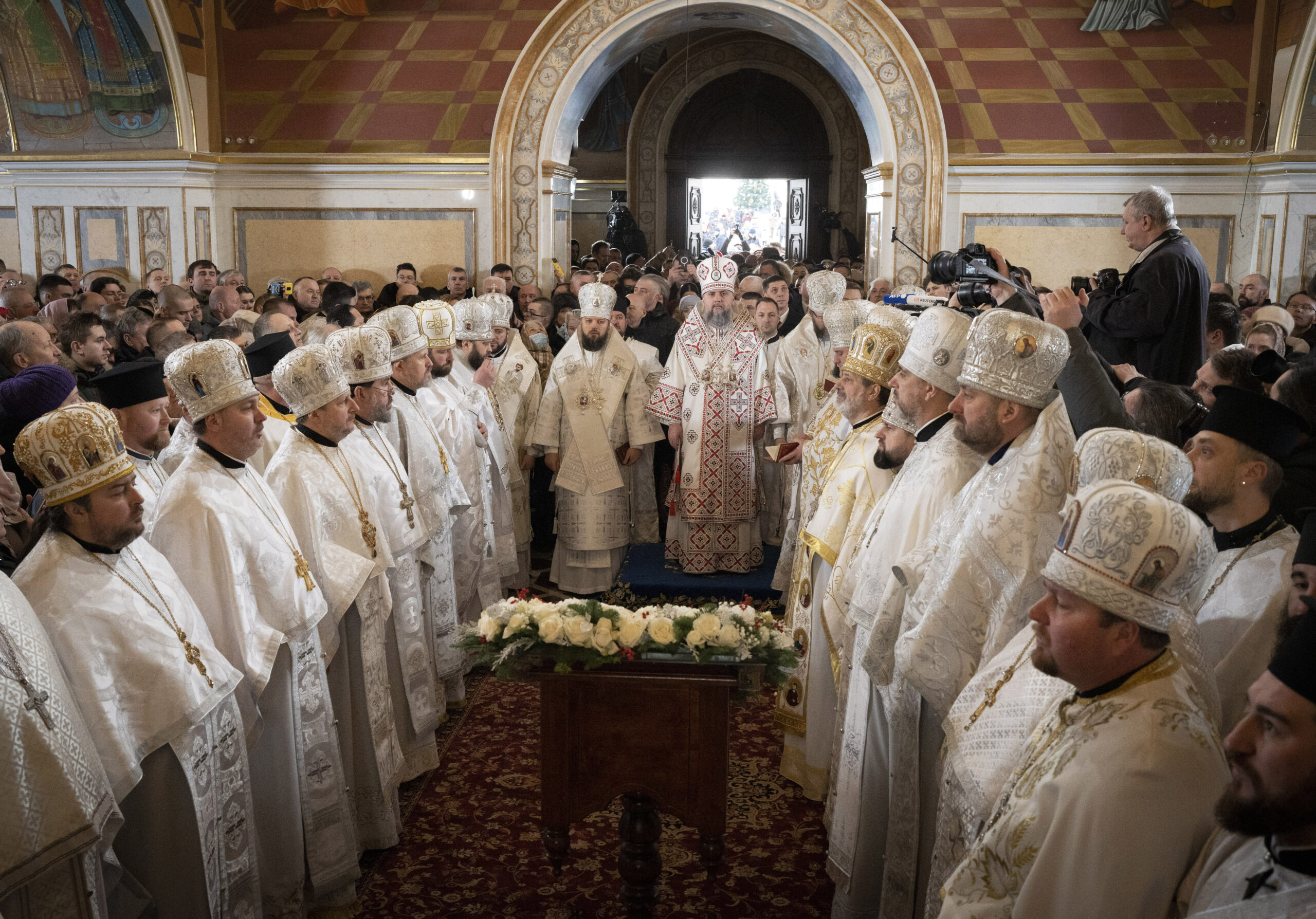
Metropolitan Epiphanius, center right, and priests deliver an Orthodox Christmas service inside the nearly 1,000-year-old Pechersk Lavra Cathedral of Kyiv, Ukraine, Saturday, Jan. 7, 2023. Hundreds of Ukrainians heard the Orthodox Christmas service in the Ukrainian language for the first time at Kyiv’s 1,000-year-old Lavra Cathedral on Orthodox Christmas Day, a demonstration of independence from the Russian Orthodox Church. (AP Photo/Roman Hrytsyna)
It’s not the first time an Orthodox church has shifted calendars; in fact, it’s almost exactly a century after a synod in Istanbul, known as the Council of Constantinople, voted for a similar change, which was adopted in 1924 by churches across Turkey, Greece, Cyprus, Romania and elsewhere in the Balkans.
This time, however, the shift has a distinctly political character.
In its statement, the church described its decision to shift to using “the living Ukrainian language in worship instead of the traditional Slavic one” as a desire for the newly independent church to replace “centuries-old subordination.”
The “centuries-old subordination” refers to the 16th-century move to put Orthodox faithful in what is modern Ukraine under the purview of the Patriarchate of Moscow.
The church officially split from the Russian patriarch’s jurisdiction in 2019, when Bartholomew I, the ecumenical patriarch of Constantinople — styled “the first amongst equals” among all Eastern church patriarchs and therefore the closest thing the Orthodox world has to a universally recognized authority — granted the church a “Tomos of Autocephaly,” or a decree of independence.
The decision was one of the most controversial in recent Orthodox history, and it put the Russian church, the largest in the Orthodox world, at odds with Constantinople, the church’s historical capital.
“In general Orthodoxy is divided in two big parts, represented by two leaders,” Metropolitan Yevstratiy, of the central Ukrainian city of Bila Tserkva, told Religion News Service in a recent interview. “One part, which is represented by Ecumenical Patriarch Bartholomew, is a contemporary type of Orthodoxy, which is open to the contemporary world and contemporary people, and has answers to real contemporary questions.”
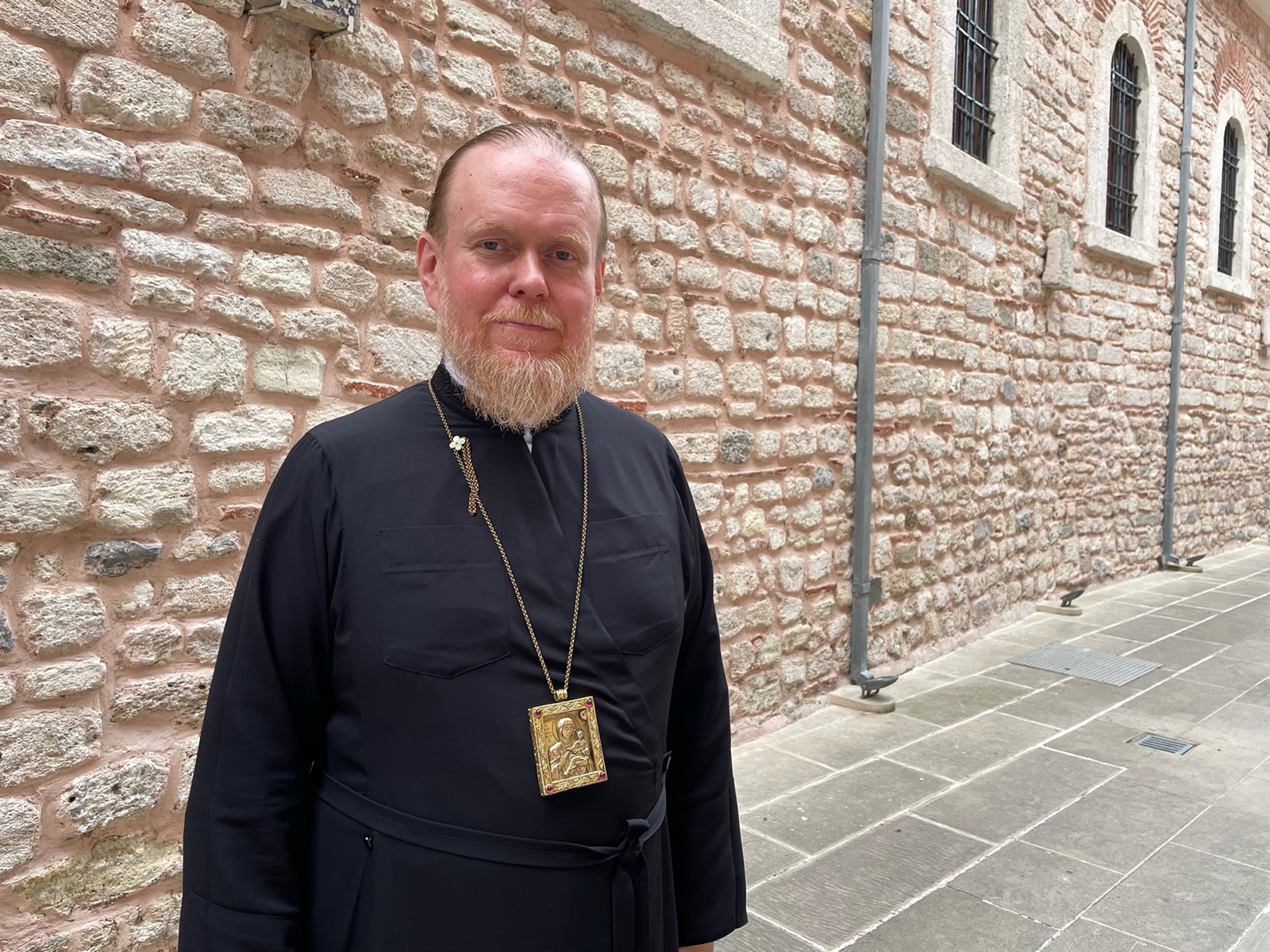
Metropolitan Yevstratiy of Bila Tserkva, Ukraine, photographed in Istanbul. Photo by David Ian Klein
By contrast, said Yevstratiy, “Russia and specifically (Moscow Patriarch) Kiril Gundayev represent an attempt to reconstruct a medieval type of Orthodoxy, an Orthodoxy not contemporary but turned to the past, a part of Russia’s neo-Imperial project.”
The split has reverberated far outside of Ukraine and the influence of Russia, both theologically and financially, and, among Orthodox churches everywhere from Jerusalem to Mt. Athos in Greece and beyond, it has become increasingly controversial.
In the wake of Russia’s 2014 invasion of eastern Ukraine and annexation of Crimea, it became blatantly clear that Orthodox Christians in Ukraine needed an exit from Russian canonical jurisdiction.
The 4% of Ukrainians still associated with Orthodox churches backed by Moscow are regarded with suspicion by their neighbors, and their priests have faced charges of treason and spreading pro-Russia propaganda since the onset of the war last February. The Ukrainian government has been locked in a legal battle since March to expel a group of Moscow-backed monks from a millennia-old cave monastery in Kyiv.
After gaining autocephaly and changing their liturgical language from Old Church Slavonic to modern Ukrainian, changing calendars, Yevstratiy believes, is the final step toward fully decoupling his church’s identity from Russia.
“From the very beginning, questions of astronomy and of mathematics were converted to questions of religion and identity, religious identity and national identity,” Yevstratiy told RNS.
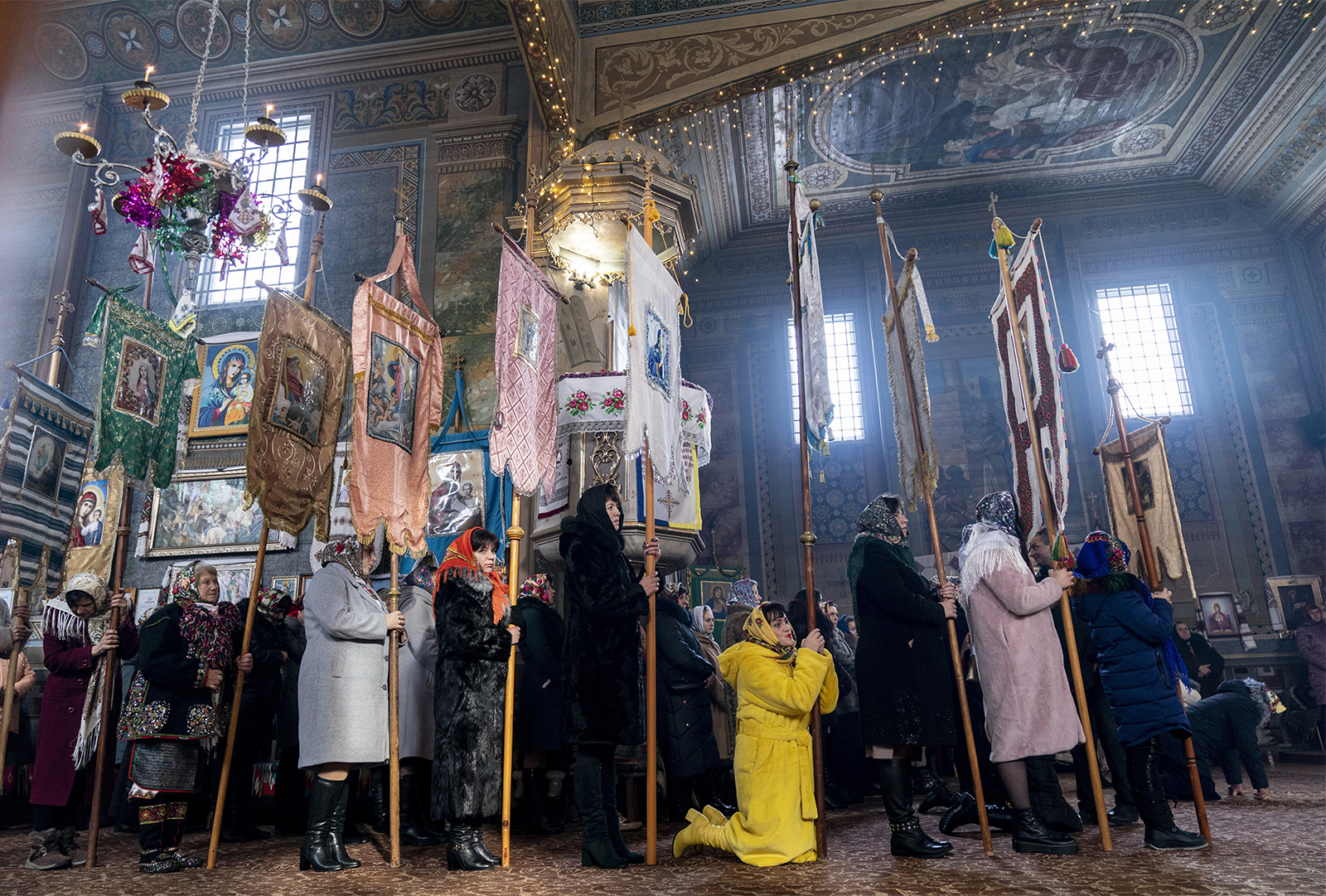
Parishioners attend the Orthodox Christmas Mass in the Holy Trinity church in Iltsi village, Ivano-Frankivsk region of western Ukraine, Thursday, Jan. 7, 2021. (AP Photo/Evgeniy Maloletka)
It’s not the first time that adherence to the calendar has taken on political significance. When Ukraine was under the rule of Catholic monarchs from the mid-1500s until 1795, holding to the Julian calendar was a statement of Orthodox piety and Ukrainian nationalism.
At the time, to adopt the new calendar was akin to converting to Catholicism, and in effect adopting a Polish identity.
The war has completed the cultural shift, Yevstratiy said. “Now people ask themselves, why must we celebrate together on the same days with Russians, and not Europeans and the other Christians who support us.”
A poll by the Ukrainian government held in December 2022 showed that nearly 60% of Ukrainians supported moving the date of Christmas to December 25. Yevstratiy said that just a few years ago, it was as low as 15%.
“This old calendar was the big issue which connected us with Russia and with this past Soviet cultural tradition,” said Dmytro Horyevoy, an Orthodox Ukrainian and a scholar of religion who had advised the Ukrainian Parliament on religion-related bills. “We are now in a case that Ukrainians and Ukrainian society, the Ukrainian state, really wants to join the European Union and become part of the Global West.”
He explained that acceptance of the change has varied based on geography, though it was ultimately widely accepted.
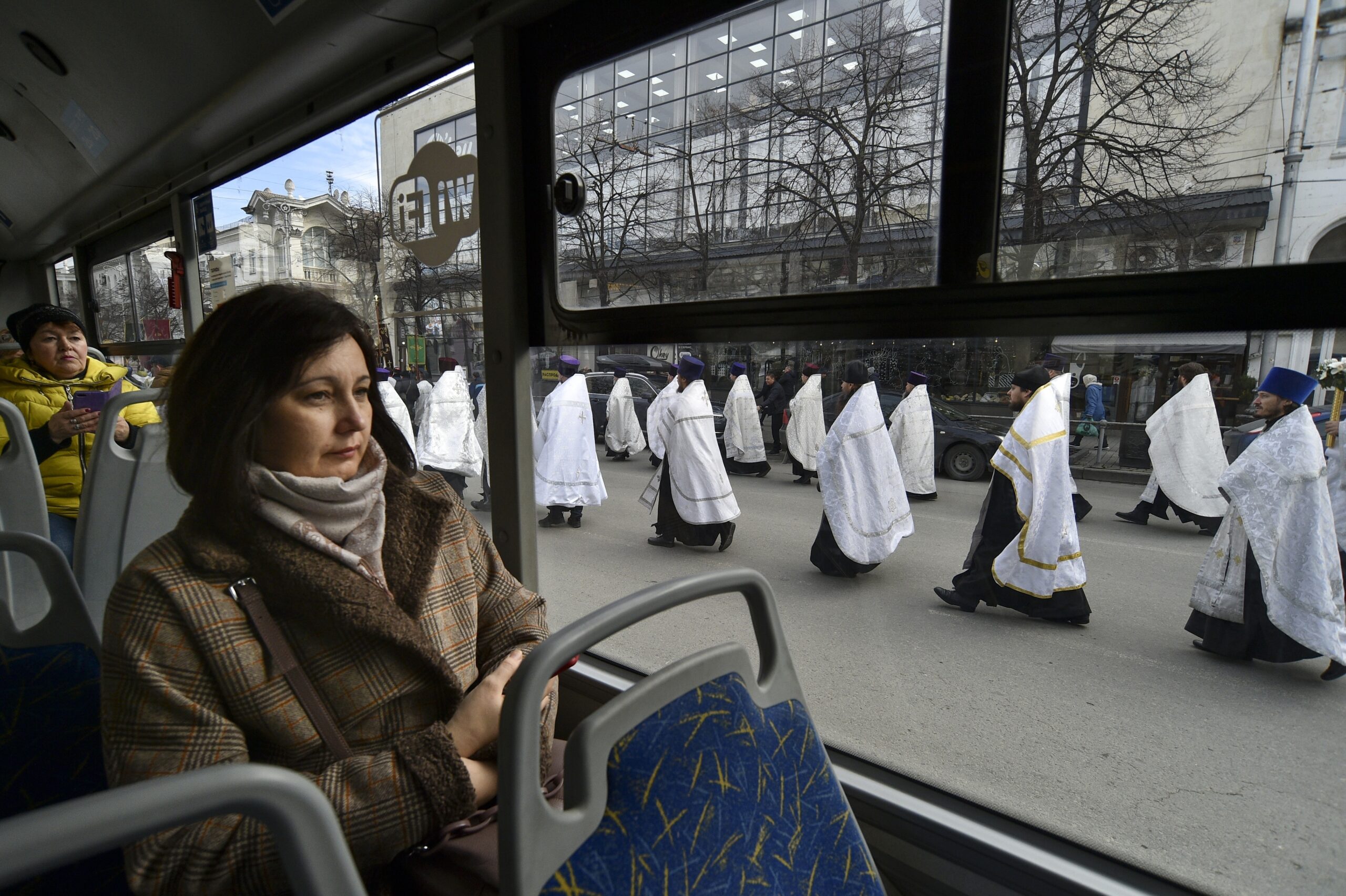
A woman looks through a bus window as Russian Orthodox priests and believers participate in the procession celebrating Orthodox Christmas in Sevastopol, Crimea, Saturday, Jan. 7, 2023. Orthodox Christians celebrate Christmas on Jan. 7, in accordance with the Julian calendar. (AP Photo)
“I think that the West, the people from Western Ukraine, who are really close to Poland, they fully supported the change, but there were more discussions in the southeast, where people were more culturally close to Russia,” Horyevoy said. “But generally, according to sociological surveys, most of the population accepted this change.”
“I don’t think that it will really change our lives because it’s just a day, just a number in the calendar, but the core of the sense of the holidays, that is the same,” he added.
As the largest and most prominent church in Ukraine, the OCU’s decision has an impact far outside of its own flock.
“I am Catholic, but my family and I followed the old calendar like everyone else in Ukraine,” Nataliia Kravchuk, a Ukrainian woman, told RNS. Kravchuk noted that after the tradition of her grandmother, her family actually celebrated two Christmases a year, on both Dec. 25 and Jan. 7.
“My family is glad that now we will officially celebrate all holidays according to the new calendar,” she said. “Of course, this is unusual for some people. We have many traditions, especially at Christmas; it will be necessary to get used to new days and dates.”
Konstiantyn Karnoza doesn’t consider himself particularly religious but comes from a family that in past generations was Orthodox. He grew up celebrating Christmas in a secular manner on Jan. 7 but will be following the church’s lead in shifting calendars.
“My position on the calendar question is that it is a perfectly sane and rational decision under the circumstances we have,” Karnoza, a programmer from Dnipro, told RNS. “I’ve been waiting for this decision, switching to the Western, Catholic way, of celebrating because it is a way to becoming more connected to the West and less connected to the East.”
“It is a thing we’ve needed for a long time now. For me, it’s been obvious for a long time that we need to switch to the Western way in as many different ways as possible,” Karnoza said, noting that he would support the adoption of the Latin alphabet over the Cyrillic one as well.
The decision, Yevstratiy said, was ultimately driven by the desires of the church’s lay people.
“Every time, I try to use a phrase from the Gettysburg speech of Abraham Lincoln,” Yevstratiy said. “We are a church from the people, by the people and for the people. We are not a state church. We are a state-supported church, we support the statehood of the Ukrainian nation because we see that keeping our independence and territorial integrity and statehood is the best way to protect our freedom, freedom of religion and belief particularly.”
